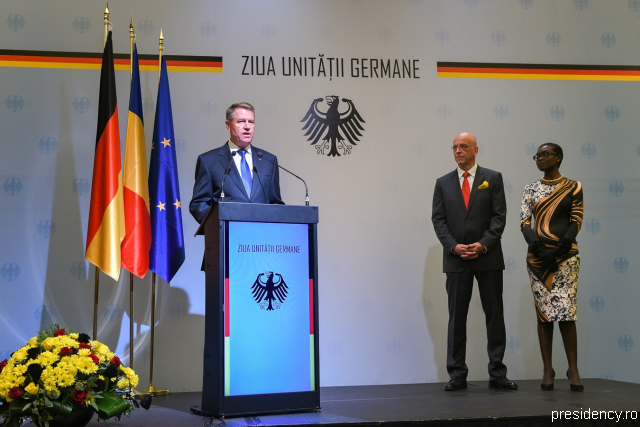Romania-Germany relations, in the spotlight
German Unity Day made for an excellent opportunity to analyse relations between Bucharest and Berlin.

Bogdan Matei, 03.10.2018, 12:28
Romania will encourage European unity during its presidency of the European Council in the first half of next year, Romanias President Klaus Iohannis promised Tuesday while attending the ceremonies held in Bucharest to mark German Unity Day. Almost three decades after the demise of communism in Bucharest and East Berlin and the German reunification of 1990, President Iohannis has welcomed the fact that Romania and Germany share a common approach to the European Union. Efforts to maintain unity should continue, particularly in times like these, when partisan politics is growing strong, the head of state went on to say.
At bilateral level, President Iohannis recalled that for many years now Germany has been Romanias top trade partner, with massive investments in the development of Romanian economy. Relations between Bucharest and Berlin “are special and strategic, based on friendship and trust, also drawing on excellent social and person-to-person interactions, the president also said.
In this context, Klaus Iohannis said the German minority in Romania, as well as the Romanian community in Germany have helped improve bilateral relations. Himself a member of the German-speaking community in Romania, Klaus Iohannis said that, 100 years ago, at the end of the Great War, the German minority in Transylvania was the first that recognized, in the Proclamation of Medias, the Union of Transylvania, which had been under Austro-Hungarian rule up to that point, with the Kingdom of Romania. History has taught us that unity is key to progress, both at national and European level, President Iohannis said.
In turn, the German Ambassador to Bucharest, H.E. Cord Meier-Klodt promised that Berlin would continue to support Bucharest, arguing that unity in diversity is “one of the most beautiful and distinctive features of modern Romania, which should be celebrated as such in the year of the Great Union Centennial. Modern Romania, Ambassador Meier-Klodt added, has overcome a whole century of huge challenges and catastrophes, “standing united as a country with multiple ethnic, linguistic and religious groups, resembling a smaller version of early Europe, with a powerful German community.
Totaling some 750,000 in the interwar period, German nationals started to move back to Germany in large numbers at the end of World War II with the instatement of communist rule in Romania. Today, there remain less than a hundred thousand. According to data made public by the Federal Statistics Office of Germany, Romanians account for the fifth-largest minority in Germany, with over 860,000 people. Most of them are either German nationals returned from Transylvania, Banat and Bukovina, or immigrants seeking a better life.
(translated by: Vlad Palcu)






























